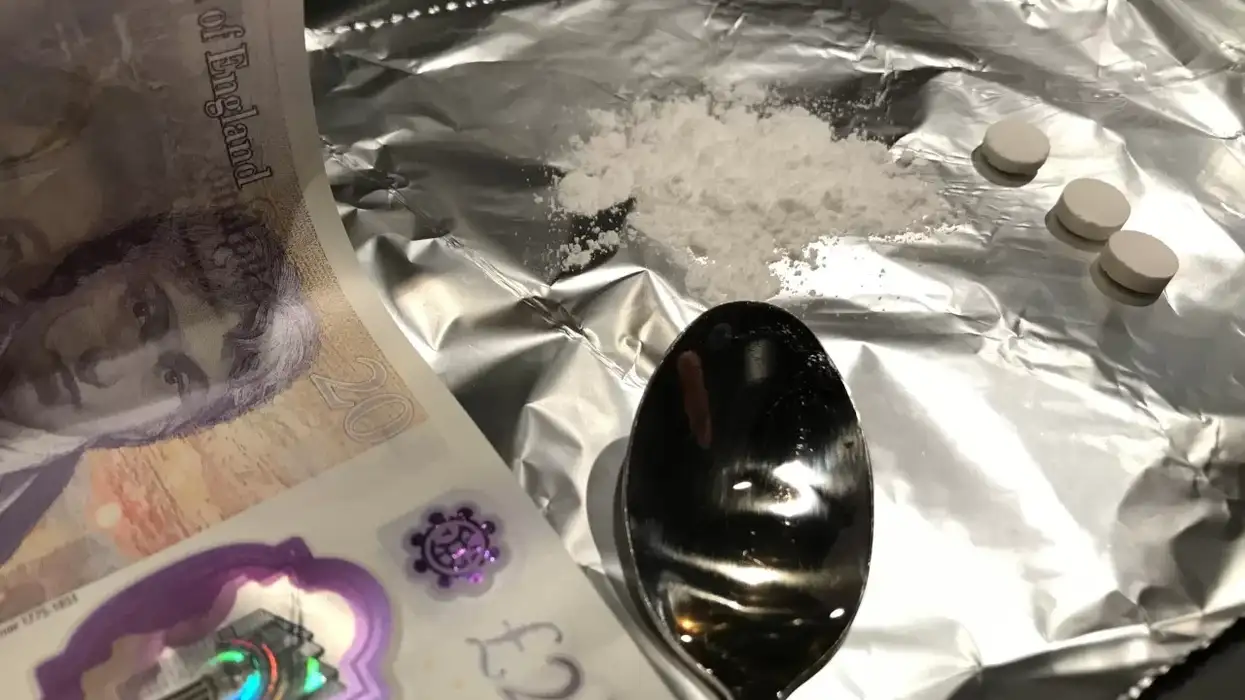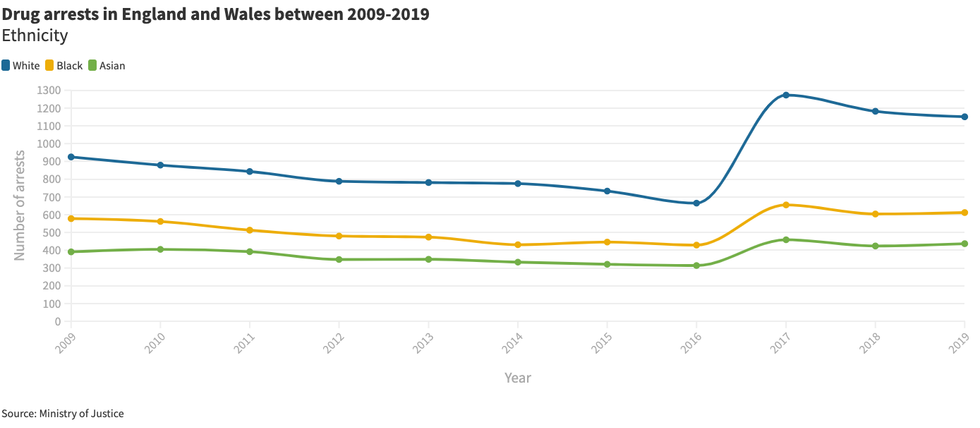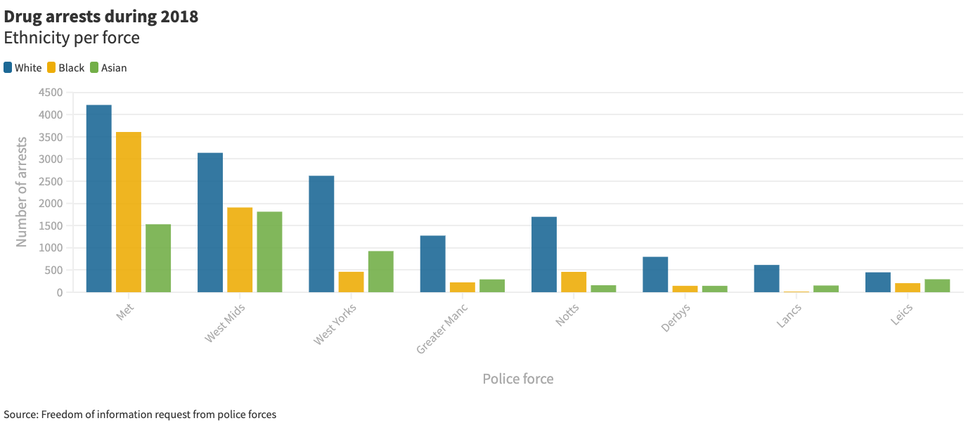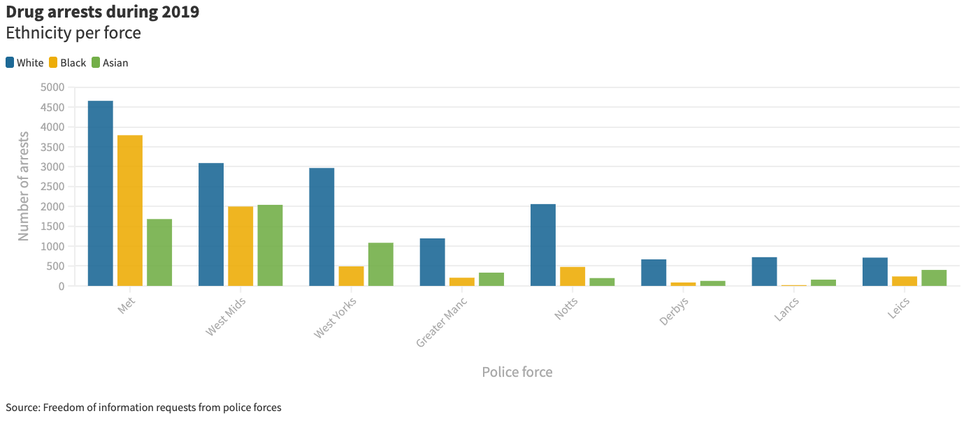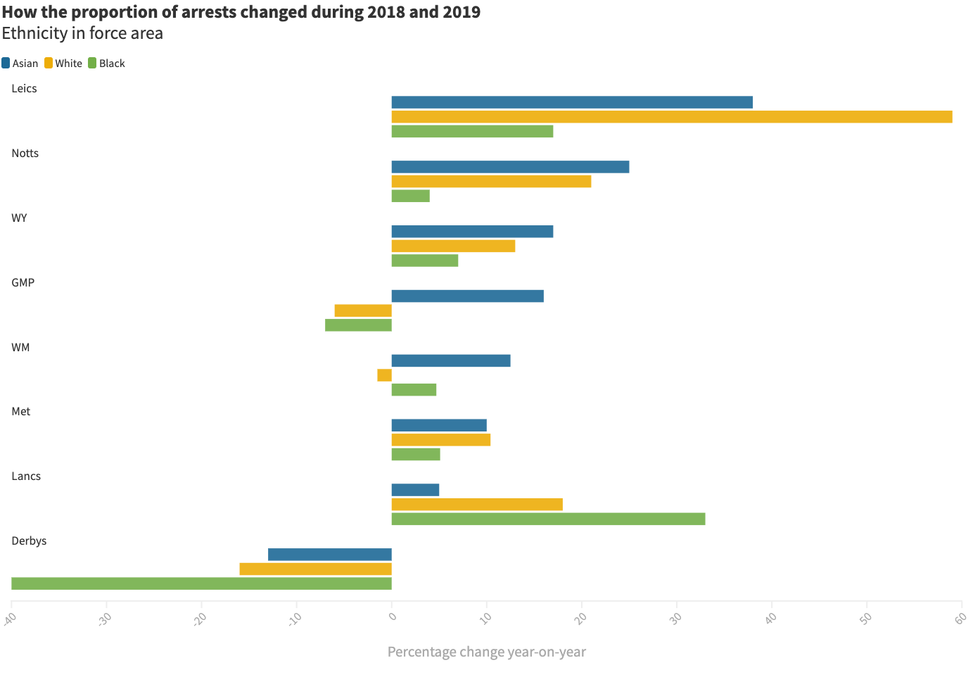Exclusive
By Barnie Choudhury
MPs and experts have called for an overhaul of the Home Office’s strategy to tackle drug-related crime after an Eastern Eye investigation revealed a steep increase in the number of south Asians being arrested for drug offences.
After an 11-month investigation, we can disclose that in at least one force, data shows an almost 40 per cent rise year-on-year in Indian, Pakistani and Bangladeshi arrests.
We can also reveal that the Home Office does not have a specific plan to tackle drug crime in south Asian communities.
The MP for Slough and shadow rail minister, Tan Dhesi, is concerned that the police appear to be taking a “one-size-fit-all” approach to policing.
“When we're dealing with issues of crime, and in this case drugs, we cannot have a one size fits all model. We need to look at regional disparities. We need to look at disparities urban and rural, we need to look at what is going on beneath the surface within different communities.”
Analysis by the Sentencing Council also reveals that Asians are 1.5 times more likely to be sent immediately to jail than white offenders. Black people are 1.4 times more likely.
Analysing data
Using the Freedom of Information Act, Eastern Eye examined eight police force areas with a high Asian population, by asking them for their arrest figures for drug offences during 2018 and 2019.
We can reveal that in three force areas the percentage rise year-on-year was higher for Asians than black and white people.
In one force, the fall in the number of arrests was lowest among Asians.
The Labour MP for Birmingham Perry Barr, Khalid Mahmood, said the police were failing to interrogate the data.
“They have to understand local communities, and I think also they have to understand what the links are,” he said. “They have to get better intelligence. They should have far more officers from the Asian community, they should listen and learn from them, and give them the priority to understand what the community is like.”
When Eastern Eye asked the Home Office for its strategic approach to tackling drug offences specifically in south Asian communities, it refused to answer despite several attempts.
The south Asian problem
For decades drug services refused to acknowledge that usage and dealing existed in south Asian communities.
It was the work in the 1980s of the now Professor, Lord Patel of Bradford, which showed that Asians were producing, distributing and using.
This reporter worked with Lord Patel to investigate and highlight the lack in intelligence almost 25 years ago.
More than two decades on, among south Asian communities things have got worse, according to dealers, former dealers and experts.
“We as a society ignored it, we as the Asian community ignored it, lots of services ignored it,” said the peer. “We were not collecting good ethnic data to identify hotspots and what was happening, and that enabled a larger criminal market and a more sophisticated criminal market to grow. Something I predicted many years ago would inevitably happen.”
By talking to former and current dealers Eastern Eye can reveal what has changed in a quarter of a century, or a generation ago.
- Where once Asians stuck to heroin, they have branched out to other Class A drugs.
- The use of organised crime syndicates and county line gangs has increased with routes across England. From Bradford the drugs will be couriered to Manchester to Stoke/Birmingham (West Midlands) to Derby/Nottingham to Leicester (East Midlands) to Bristol (the south west) to Slough (the south east) to London.
- We knew that organised criminals worked along familial lines with brothers, uncles, aunts and in-laws all involved in the trade. But over time, the criminal ties have become even slicker and harder to catch.
- Where once south Asian children were kept away, some as young as 7 are now being groomed for drug and gun running.
- It is the same with south Asian women. Where once they would be off-limits, girls as young as 14 are now being deliberately hooked on heroin, crack, cocaine and crystal meths and forced into prostitution, dealing and distribution.
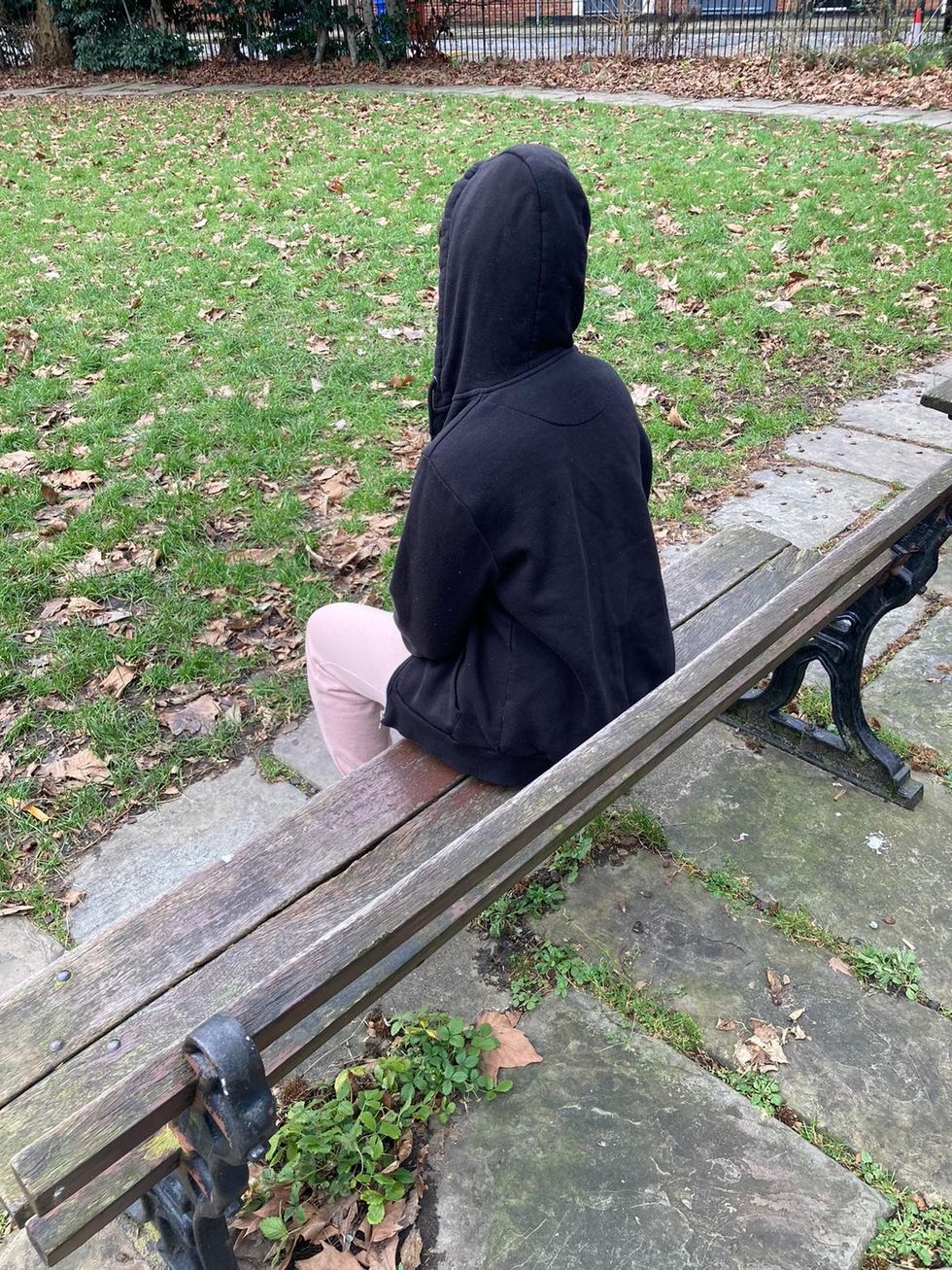
At 33, Kalpana* from Leicester is a veteran in the drugs trade, fast climbing up her syndicate’s ladder.
If there were seven levels from the drug lord to street dealer, she is at fourth base. She has her own driver, can earn up to £5,000 per week, and the group above her can make £10,000.
Kalpana has never been caught.
“No one will ever guess that I deal,” she told Eastern Eye. “I’m respectable. I don’t run around, I don’t drive around. They come to me for appointments to buy their cues [seven ounces of heroin or crack or cocaine].
“It’s been difficult with the lockdown and Covid, but I’m still earning. I’ve never been convicted, never been suspected because I keep my mouth shut. I go for those who’re employed on a regular income and want their fix, who I’ve known and who are not noticeable.”
But her story is one this paper has heard time and again, where an Asian man hooks an Asian woman on drugs.
“When I look back on it, I realise I’d been tricked into taking a smoke laced with heroin. They knew what they were doing. They needed runners, and I was an easy target. First it was free, then once they knew I was hooked, they asked for money.
“I had no choice but to move in with him, and start to sell, distribute so I could feed the habit. He kept a watch on me and made sure I did as I was told, and that I made enough.”
Luckily Kalpana was not forced into prostitution, but she knows other Asian girls, some as young as 14, are expected to become sex workers to feed their habit and bring in cash for their pimp.
In England and Wales, government figures reveal that between 2018 and 2019, the number of arrests for white suspects went down by almost three per cent, while they went up by more than three per cent for Asians and 1.3 per cent for black people.
County line gangs
What the data shows is that more Asian children are getting involved in the drugs trade, in so-called county line gangs.
Although a child is defined as anyone under 18, children under-10 cannot be arrested.
Criminal Justice statistics supplied by the government show that for children there was a 29 per cent increase in the number of Asian arrests during 2018 and 2019, from 31 to 40. This is substantially higher than for white and black children at zero and nine per cent increase year-on-year respectively.
But these figures may not be accurate because one force which did breakdown ethnicity and age revealed a surprising statistic.
Greater Manchester’s FOI data showed that for Asians aged between 11 and 17, police arrested 28 and 30 during 2018 and 2019 respectively.
That is a seven per cent year-on-year rise, and the arrest figures are almost the total figure for all of England and Wales.
The Home Office refused to explain why there was an anomaly.
Even when a child wants to leave, it may not be possible, according to a former detective superintendent from the Metropolitan Police.
Shabnam Chaudhri was an undercover cop for many years with “prolific and high-level drug dealers”. She left the force in December 2019 but did lead the gangs’ unit in Hackney, east London.
Gangs will groom children, especially girls, outside the school gates, by offering them things they do not have, such as trainers or give them pocket money. They will become messengers and couriers of guns and drugs, because the authorities will not suspect them of doing anything illicit.
But once they can travel unaccompanied, they will be sent across county lines on public transport with cash and drugs, she told Eastern Eye.
“The kids, travelling from London to Birmingham to Manchester, think that they're going to an address. Before they get there, they'll get robbed deliberately by those that have already targeted them to groom. And then they're owned by them. You now owe me £2000 pounds, because you lost my drugs, and now you're going to have to start working for me.”
She described it as “a horrible, tragic cycle to get involved in”.
“These kids don't actually realise the tragedy that they're actually walking into. They don't go into some beautiful five-star hotel, they get locked into rooms. They get to have drugs secreted into them, and they're so petrified of the threats made to their families and extended families, that's how they get involved.”
Proper data collection
But there remains a problem. The police are not investigating the data properly, according to our sources.
Lord Patel of Bradford, who pioneered research into drug use in south Asian communities, warned that without proper methodological collection and analysis the police will not know how the criminal market is growing.
“We actually can make predictions. We can assess what's happening and what's going wrong. Unless everybody's collecting the same data in the same manner, and collating it, analysing it, then I'm not sure how you run a service effectively.”
This was evidenced during our investigation. Some forces responded by saying that the “information is not recorded in an easily retrievable format. To locate, retrieve and extract the requested information requires a manual search of all records held.”
“I’m extremely concerned to see these alarming reports of women and young children being groomed to undertake county lines,” Tan Dhesi MP told Eastern Eye. “That's why I think we need to work now collectively, with the police and the authorities, to make sure that we try to stamp this out.”
The Birmingham Perry Barr MP, Khalid Mahmood, thinks the underlying reason is the cut in funding for community resources leading to a generation of bored teenagers who turn to gangs and violence.
The increase Asian children being suspended from school also adds to the problem, he said. But the MP wants the police to recruit more Asian officers to help them combat a growing problem.
“What I don't agree with is the police using informers. And part of this problem the police have is using informants to provide intelligence that is very skewed, because they will protect themselves and be negative in terms of everything else. So instead of doing that, we need police officers who understand the community, understand the language, and understand the culture and get that across.”
The shadow railways minister and Slough MP, Tan Dhesi, has asked Eastern Eye for more information about our investigation. He said he would speak to the Thames Valley chief constable about the rise in county line and organised gangs in the Asian communities.
“Enough is enough. We really need to get the police on board. I don't think there should be taboo subjects with regards to drug use, we need to tackle that head on, now, because if we do not take steps, then it will impact all of us.”
Next week, we report on what police are doing to tackle county line gangs and tell about the experiences of two former drug dealers high up in organised crime.
*We have changed the names to protect their identity.
Analysis
The government’s figures show that between 2009 and 2019, drug offences were decreasing until 2016. Then in 2017, they went up sharply. While they have been steadily going down for white offenders, the opposite has happened for black and Asian people in 2018 and 2019.
The data obtained by Eastern Eye, under the Freedom of Information Act, shows that police forces are not collecting the statistics in a unform way.
It also appears that they are not analysing the figures in a way which would spot patterns to alert them where extra resources may be needed.
Superintendent Rich Agar, the West Midlands Police lead for county lines said, “We don’t target particular parts of our community for our drug enforcement or safeguarding activity. We take action where the intelligence directs us to target drug offenders and protect vulnerable people.”
Eastern Eye could only analyse two aspects from all our responses: the actual arrests in terms of ethnic groups and the percentage change year-on-year.
Even then, because of the way the ethnic groups are labelled by different forces, we could only split them into three main groups: white, black and Asian. Wherever we could, our analysts removed any group which was not specifically south Asian.
While the data collected is of some value, lack of a uniform approach may mean the police are obvious intelligence, said Lord Patel of Bradford.
“Let's assume there's a particular ethnic family in a northern town that's dealing drugs, and there are several arrests from there. But the supplies are coming from a village in Pakistan, and that family has extended family around the Midlands, or in the south, and the drugs are coming in there as well.
“If you’re collecting that ethnic background [data], there'll be a pattern that emerges, and you could probably then intervene to ask, well, who's the main dealer here? Where's the hub of this? Otherwise, you're just dealing with isolated pots of we've got fewer arrests here and there, without understanding that higher level drug dealing market, which I believe it's come to now.”
In West Yorkshire, Greater Manchester, and Nottinghamshire, Asians topped the percentage change year-on-year. In Nottinghamshire, for example, that rise was 25 per cent.
In Derbyshire, the year-on-year arrest figures decreased for all three ethnic groups, but the lowest fall was among Asians arrested.
Greater Manchester Police, which is under special measures, promised to work with Eastern Eye to report this story.
Detective superintendent, Daniel Inglis, of GMP's department of serious and organised crime said, "Although a rise in arrests may understandably initially appear as a concern for some people, it does however highlight the proactive approach GMP is taking to combatting the supply of drugs and getting them off our streets.
"Reasons for possession of illicit substances can vary significantly, meaning that we cannot look at one set of data for the root cause."
In the West Midlands, the numbers of white people arrested went down by 1.3 per cent, while they went up by almost five per cent for black communities and nearly 13 per cent for Asians.
In Leicestershire, although more white people were arrested year-on-year, Asian arrests rose significantly during that period by 38 per cent.
Leicestershire Police have told Eastern Eye that they do engage with south Asian communities, but there will always be gaps in intelligence.
“There's intelligence gaps across every community. Trust in policing, trusting people our partner agencies we speak to, the impact of speaking to law enforcement, may be some of the reasons. But we see the issue of intelligence gaps and coverage around all of our communities as a common theme.”
